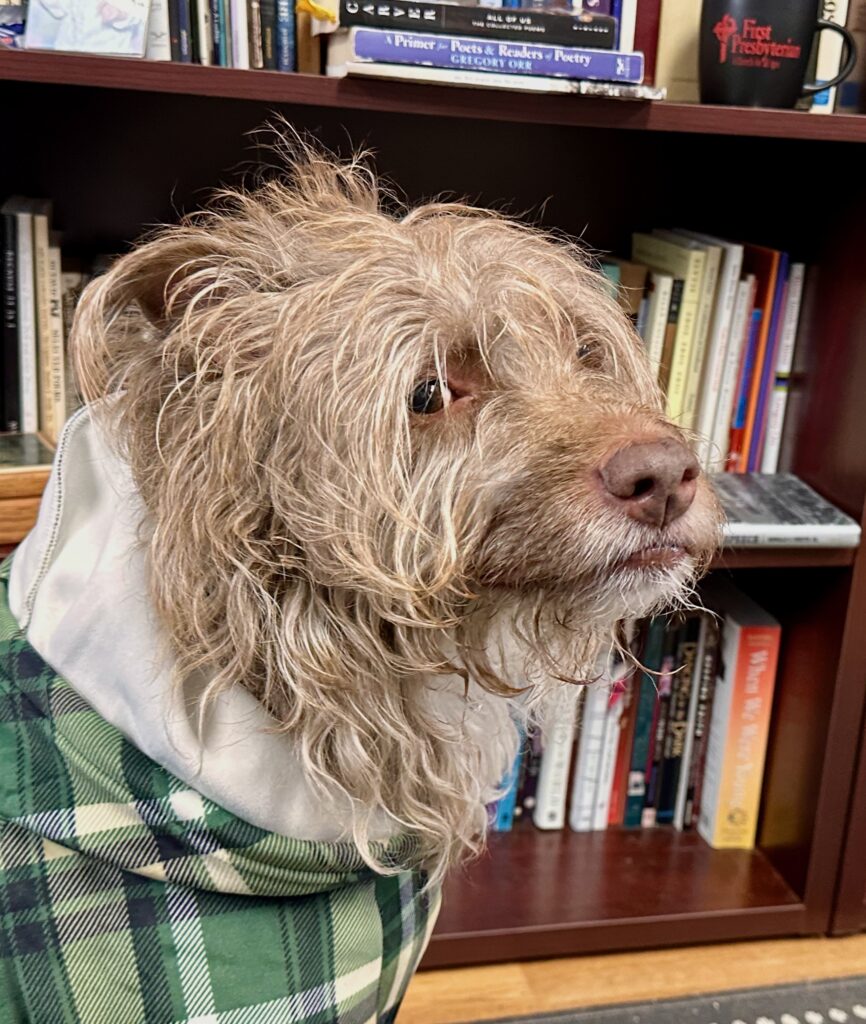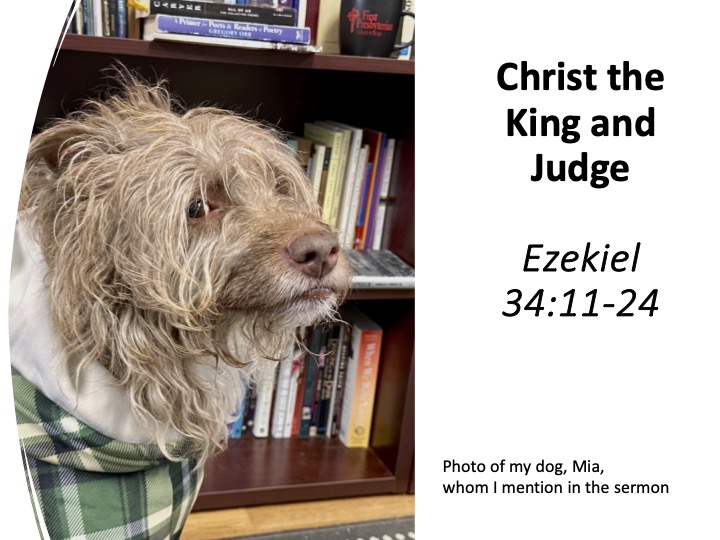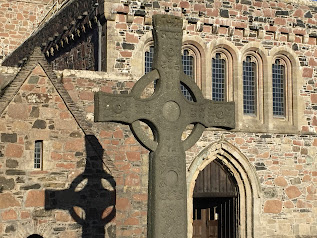Jeff Garrison
Mayberry and Bluemont Churches
November 26, 2023
Ezekiel 34:11-24[1]
Hugh Latimer, a Calvinist, served as Bishop of Worcester in the 16thCentury during Henry VIII’s reign. He was a leader in the English Reformation. King Henry VIII, until he couldn’t obtain a divorce, aligned with the Roman Catholic Church. One Sunday as Latimer prepared to enter the pulpit, he looked out and saw Henry sitting in the pews.
“Latimer, be careful of what you say today. King Henry is here,” he heard whispered. But then, as he entered the pulpit, he whispered to himself, “Latimer, be careful of what you say today; the King of Kings is here.”[2] Latimer later suffer martyrdom at the hands of Bloody Mary.[3]
Today we’re reminded that like Latimer, we live out our lives in the presence of the true King, Jesus Christ. It’s Christ the King Sunday. That may not mean much to those of us who grew up in non-liturgical churches. After all, Christ should be our king 365 days a year. Make that 366 days next year—it’s a leap year.
Before reading the scriptures:
As we heard in our New Testament reading,[4] as a king, Christ surprises us. He comes disguised as the poor, the needy, the sick, or one in prison.[5] We also think of Christ as the good shepherd, a common metaphor used for kings in scripture as in the ancient world.[6]
As a day on the church calendar, Christ the King is relatively new. It was added roughly 100 years ago by Pope Pius XI. Protestants originally shunned the day as too sectarian.[7] In time, however, many Protestant churches adopted the day which falls on the last Sunday of the church’s year. Next week, with Advent, we begin a new cycle in the church’s calendar.
When he introduced Christ the King, Pius XI was concerned how the church should respond to the world. Mussolini ruled Italy and atheistic Communism threatened from Russia. Both demanded the worship of the state. A few years later, as fascism spread in Europe, a handful of Protestants took their turn at speaking out. A group of Reformed and Lutheran Church leaders in Germany published the Theological Declaration of Barmen in 1933. We’ll read from this Declaration as we profess our faith this morning after the sermon. For Christians, Christ is Lord and demands our ultimate allegiance.
Now, proclaiming Christ as King isn’t a new concept. Scripture proclaims Christ as king. [8] Our Confessions lift his kingly role as one of the three offices of Christ, the other two being prophet and priest.[9]
My sermon this morning comes from a prophecy given to the Prophet Ezekiel. Ezekiel addresses the Israelites in exile in Babylon and lifts a vision of a new order. God will become the “shepherd” of his people. Of course, we who live on this side of the resurrection know the “Good Shepherd.” Read Ezekiel 34:11-24
###
Do you remember Calvin and Hobbes? There was one strip where Calvin was swinging on the playground at school. The bully Moe, who looks to be twice Calvin’s age and as one who may have repeated more grades than he’d passed, calls Calvin a “Twinkie,” saying “get off my swing.” Brave Calvin responds, “Forget it, Moe, wait your turn.” Moe responds with a right punch that knocks Calvin out of the swing and onto the ground. Pulling himself together, Calvin mumbles, “It’s hard to be religious when certain people are never incinerated by bolts of lightning.”[10]
I expect the Israelites in exile felt the same. Where was their God when the Babylonians stormed the walls of Jerusalem? Some lost their faith. But others remained hopeful. Ezekiel speaks to them with a promise. No longer will those in power lead; no longer will those who abuse others continue their terror. Instead, God will lead as a shepherd. As a true shepherd God will protect Israel. This passage contains both judgment and promise!
To fully understand this passage, we should look at the 34th chapter in its entirety. (Your homework assignment for today is to read the chapter in its entirety this afternoon.) The chapter revolves around the “shepherd allegory.” Kings were often called shepherds in the ancient world.[11] The shepherd image for a king implied one who cared and nurtured his subjects. Ezekiel uses this metaphor to highlight the hypocrisy of Israel’s kings, shepherds who “enrich themselves at the expense of the flock.”[12]
A perfect example of Ezekiel’s “bad shepherd king” would be the Czars of Russia. (Putin, Russia’s current leader, just follows their footsteps). Not only did the Czars rule ruthlessly, but they also became the richest monarchs in Europe. They did this while ruling over the poorest country of the continent.
Several years ago, I visited the Hermitage in Saint Petersburg, Russia. A home for the Czars, the place is incredible. It’d take a week to really appreciate all the collected artwork. But as I thought while viewing the treasures, “it’s no wonder the people revolted.”
A good king is not one who lives high on the hog while his subjects starve. Rather, a good king is like a shepherd, one who helps protect his subjects from danger and leads in a way that they’re provided with fresh fields (or food) and running streams (or clean water). A shepherd is an appropriate name for such a leader.
Unfortunately, Israel didn’t have too many kings like this. Surely, there were some who did a better job than others. But most looked out for themselves and for their friends, while allowing abuse of their citizens. This chapter begins with a condemnation of such wicked rulers, the “shepherds who have eaten of the fat and clothed themselves with the wool of their flocks yet have not fed the sheep.”
This is what God promises beginning in the 11th verse. “I, myself,” God proclaims, “will search for my sheep.” God will be the shepherd. God will bring the people, who had been scattered at Jerusalem’s fall, back together. There will be a reversal of their misfortune. God will provide good pasture; God will strengthen the weak; God will heal the sick; God will bind the injured; God will seek the lost. By the beginning of the 16th verse, there seemed to be a balance between judgment and promise, but then there was a shift and God again speaks of judgment.
“The fat and the strong I will destroy,” says God. Notice the shift; God no longer talks to the shepherds, or the rulers. God now addresses the “sheep and goats,” members of the flock. We heard the same thing in our reading earlier from Matthew 25. Obviously, it’s not just the leaders who are abusing their power, but there are some “sheep and goats” who abuse others.
Have you ever watched animals eat and notice how the strong push aside the weak? Eternally, I should be concerned for my dog, Mia. Often when Caroline’s dog, Apple, needs a drink, Mia will decide she, too, needs a drink. Mia is much larger than Apple and will butt the smaller dog away and then drain the bowl. We feed them in separate rooms. Sheep, and other animals, are no different.
Sheepherders spend a lot of time with the weaker animals trying to strengthen them. If an ewe gives birth to more lambs that she can nurse, the ewe will push away the weakest lamb. The shepherd will have to take that lamb and find another ewe, perhaps one with only a single lamb, to nurse. The sheepherder encourages an “adoptive bond.”[13] Otherwise, the rejected lamb will die.
Without a shepherd, strong animals take advantage of the weaker animals. And we see such behavior even among humans. Without a good teacher, bullies in the classroom intimidate other students. Without good leaders, those with economic or political clout take advantage and oppress those without.
Now that God has judged both the shepherds who have ignored the needs of their flocks and the sheep who, in the absence of the shepherds, abused the weaker ones, God returns to the future promise of a new shepherd. God and his servant David will rule and guide the flock. David, the former shepherd who became a king, will return to be God’s prince. The return of God’s king becomes the Messianic Promise spoken to Hebrews living in exile hundreds of miles from their home. God will gather the faithful together and lead them back home, and a king like David will return and rule justly.
Have these promises of God been fulfilled? Yes, some of them. And they continue to be fulfilled! A new shepherd, the good shepherd, was born in the city of David—the one you and I proclaim as Savior. We’ll celebrate his birth in five weeks! Yet, as we wait, we’re reminded over we still wait and long for the day proclaimed in scripture when Jesus Christ will return and rule. On that day, wars will cease, and every knee will bow and proclaim Christ as King. Until then, we pray, “Come, Lord Jesus, Come.”
Here’s a couple of things to take from this passage. First, be reminded that bad people exist, as do bad shepherds. There are those who rule ruthlessly and those who use their power to exclude others. As followers of Jesus, we shouldn’t do that, nor do we owe such people allegiance.
Next, there is a new day coming, one that will bring justice and hope. Ezekiel tells us that God will bring the bad shepherds and the bullies within the flocks to justice. Eternally, we have no need to fear those who abuse, for our eternal hope doesn’t rest in their hands, but in the hands of our loving Savior.
Finally, as Christians, we long for that day when Christ returns, and his kingship becomes visible. We’re to proclaim this vision to a longing world.
If our allegiance really belongs to Jesus, if Christ really is our king, then we should be like Bishop Latimer and not fear the King Henry XIIIs who sit in our midst. Nor should we fear any other person who might be pushing us to ignore Christ and follow them. Nor should we fear the crowd who may mock our decisions. Instead, we place our hope in our King, Jesus Christ. Amen.
[1] I preached this sermon, in a slightly different form, on November 20, 2011 and November 26, 2017.
[2] Robert F. Sims, “The Shepherd King,” in Under the Wings of the Almighty in “www.sermonsuite.com.
[3] Mary 1, was the daughter of Henry VIII and his first wife, Catherine of Aragon. She is also known as Mary Tudor and Bloody Mary, because of the number of Protestant leaders she had executed during her attempt to return England to Catholicism.
[4] Matthew 25:31-46.
[5] From a sermon by Jim Somerville of First Baptist Church in Richmond, VA in 2017. See https://asermonforeverysunday.com/wp-content/uploads/2020/11/Jim-Somerville-Id-Have-Baked-a-Cake.pdf
[6] Meg Jenista, “Sermon Commentary for Sunday, November 26, 2023, Ezekiel 34:1-16, 20-24. See https://cepreaching.org/commentary/2023-11-20/ezekiel-3411-16-20-24-3/ For scriptural references see Psalm 23, 95, and 100.
[7] David I. Kertzer, The Pope and Mussolini (New York: Random House, 2014), 84.
[8] Matthew 27:11; John 1:49:1 Timothy 1:17, 6:15; Revelations 15:3, 1:9
[9] “The Westminster Larger Catechism” Questions 43-45.
[10] Bill Watterson, Calvin and Hobbes (November 8, 1990).
[11] Jenista, https://cepreaching.org/commentary/2023-11-20/ezekiel-3411-16-20-24-3/
[12] Margaret S. Odell, Ezekiel (Macon, GA: Smyth & Helwys, 2005), 432.
[13] When birthing lambs, a sheepherder will often smear the placenta from the lamb born of a ewe in order to entice her to accept a second lamb to nurse and feed.



